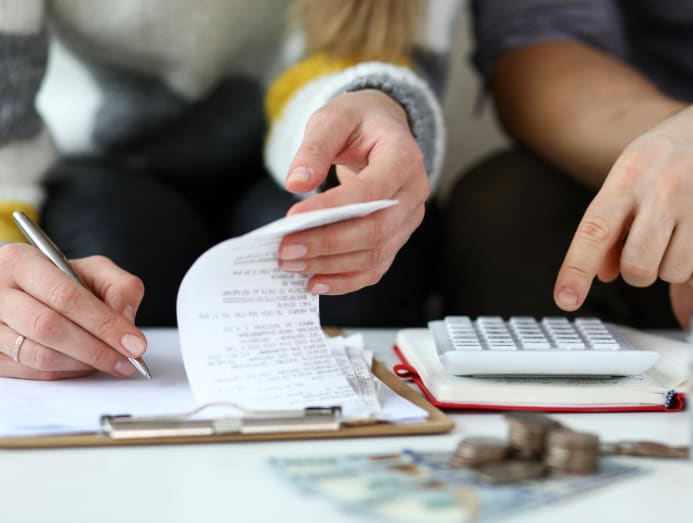Talking money with your partner: Who pays, who saves and why it matters
Few couples have direct and open conversations about finances before marriage, but not doing so can breed resentment.

When couples disagree about money, they are really expressing what they think money should be used for and it is worth spending time to understand what kind of spending is important to each person. (Illustration: CNA/Samuel Woo, iStock)

This audio is generated by an AI tool.
When you first start dating someone, you probably spend most of your time thinking about the eating places you want to take them to or special spots you want to visit together.
At this stage, the last thing you want to think about is money – but it often becomes an important part of the relationship much sooner than we think.
From deciding where to go for a meal to splitting the cost of a weekend getaway, financial decisions creep into everyday life. And the way you and your partner handle them can set the tone for your future together.
When my husband and I first started dating, we kept it simple, splitting our meals 50-50 and often ordering our own dishes. Over time, we relaxed into a rhythm – one person picked up the bill for this meal, the other for the next.
And if one of us got a bonus payout at work, that person would happily treat the other.
It's fortuitous that we were on the same page from the get-go. However, it's more common that two people in a romantic relationship might not view money in the same way.
Some are natural savers, careful about where every dollar goes. Others are happy to spend generously on experiences and gifts, and pay more for convenience – especially if their love language is gifting.
The differences can be obvious, but few couples sit down to have a direct and open conversation about it before marriage, gliding through year after year without ever discussing it directly.
And all because they would rather avoid the awkward topic around dollars and cents.
WHO PAYS FOR THE DATE?
Unlike rent or a phone bill, “relationship spending” often flies under the radar. Most of us don't consciously track how much we spend on the people we love.
We want to enjoy our time together, and their happiness in the moment matters more than the number on the receipt.

If your dates are modest – meals at hawker centres, Netflix marathons at home, walks along the beach or in a public park – the costs may barely register.
But if you often dine at restaurants, attend concerts or go on hotel staycations, the sums can quickly add up.
In many Asian societies, men are traditionally expected to pay. Even in a society as modernised as Singapore's, many people still hold this view.
A 2022 survey by investment platform Syfe and dating application Coffee Meets Bagel found that about 40 per cent of Singaporeans – men and women both – still believe men should pick up the bill on a first date.
Among respondents aged 35 and above, this proportion goes up to more than 50 per cent.
Without discussing their stance on finance, some couples find themselves arguing about "who paid last". Some may also feel that their arrangement is unfair, especially if one person is consistently footing the bill.
HAVING THE MONEY TALK
For some people, paying for their partner is not about the money. It is a way of showing care and generosity. For others, it is about partnership and achieving a sense of balance.
One partner might think, "I'm paying because I love you."
At the same time, the other might be quietly thinking, "I wish you would acknowledge that I'm capable of paying for myself."
And these differences in values – what money signifies to each of us and what we feel it should be used for – can cause misunderstandings if left unspoken.
Some couples prefer to discuss it upfront and lay out expectations early on in their relationship, leaving less room for conflict and misunderstandings later, especially when it comes to deeper issues such as credit card debts, loans and heftier types of financial commitments.
The conversation does not need to start on a serious note.
You can bring it up casually: "Hey, how do you usually like to handle bills?" or "What do you think about opening a joint account for date expenses?"
It also helps to pick up on subtle clues early. Notice who usually offers to pay, how the other parties react to splitting a bill, and whether they tend to suggest pricier activities or more budget-friendly ones.
These observations can give you a sense of their attitudes towards money before you sit down for a more intentional conversation.
Whatever the arrangement, make sure it works for both of you, because a lopsided system – such as when one partner feels like they are footing the bill more often than the other – rarely lasts.
Money talks can feel awkward at first, but they often lead to greater understanding and fewer unspoken resentments.
Admittedly, many couples around me who never quite reached a balanced consensus on how to handle finances have broken up by now.
NOT A ONE-TIME AFFAIR
However, note that a single conversation around money is not enough. With changes in our income, expenditure and life stages, it is important to revisit the topic from time to time.
After my husband and I got married, our approach to money shifted as the receipts got bigger.
Our dates were no longer just for two. We had to pay for family outings involving our parents and kids.
There is no set time to revisit the topic, but what worked for me and my husband was communicating after a major shift in our lives, such as the birth of each of our two children.
We no longer split the bill 50-50 like lovebirds on our first few dates.
What works for us today is a pragmatic approach towards our credit card use: Whoever earns the most miles when eating out and has not hit the rewards limit pays for the meal.
It is worth remembering that “fair” doesn't always mean “equal”.
Most married couples I know either take turns paying or use a joint account. Interestingly, many don't track who has paid more.
A good arrangement is one where both parties feel comfortable, valued and respected.

Equally important is a good system that can be adjusted over time to both parties' needs and changing circumstances.
At the end of the day, the goal is not just to split bills evenly. It is to build a financial partnership where both are on the same page.
This is because when money works well between you, it frees you up to focus on what really matters: the relationship itself.
Dawn Cher, also known as SG Budget Babe, is the author of Take Back Control of Your Money. She has been running a popular blog on personal finance for the last decade.













